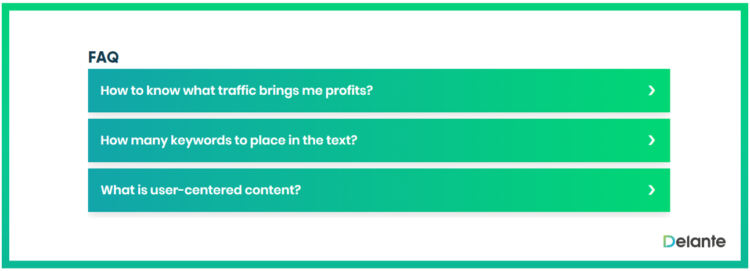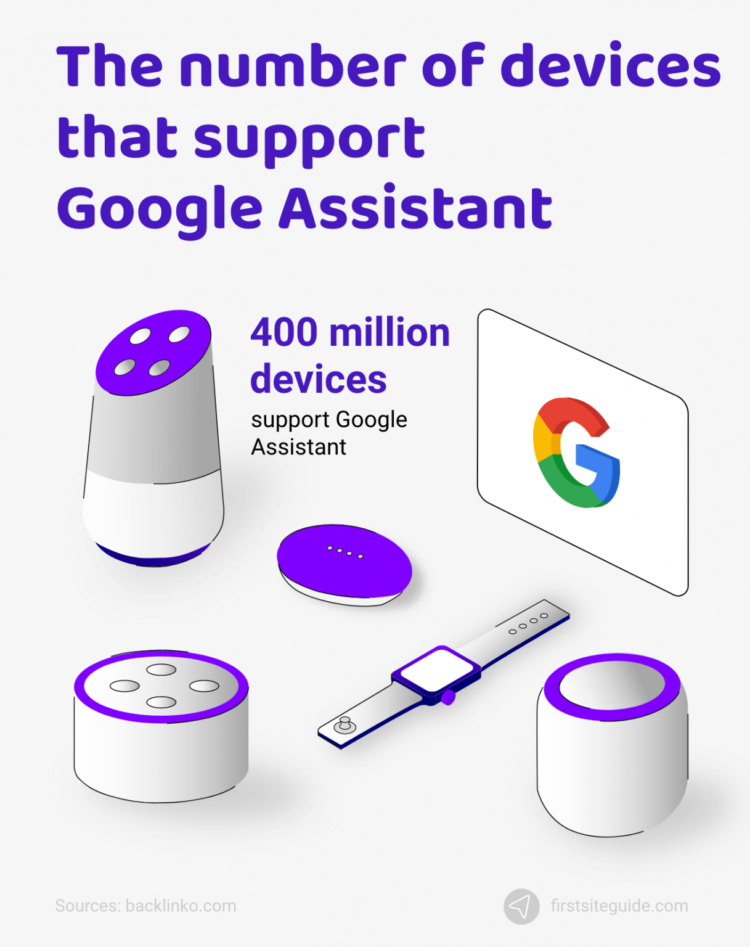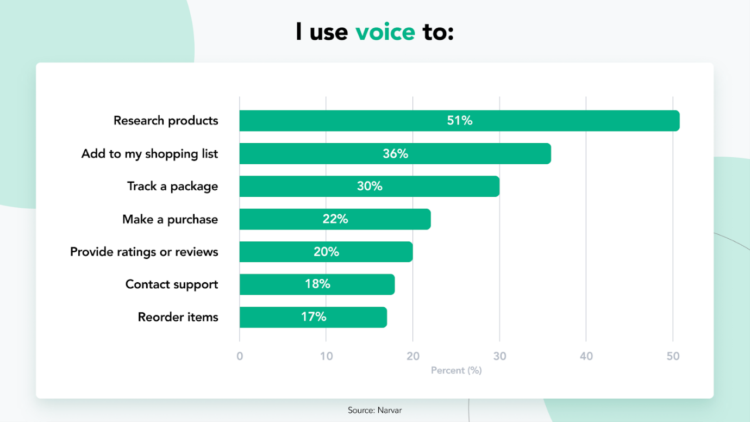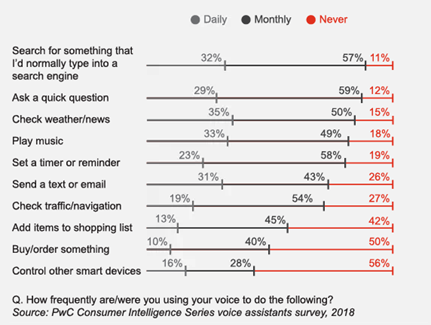- Voice Search SEO in 2022 - 9 Elements to Focus On
- Improve Your Mobile Website Loading Time
- Take Care of Your Mobile UX
- Optimize Content for Featured Snippets
- Use Natural Long Tail Phrases
- Organize Your Structured Data
- Refine Your Google Business Profile Listing
- Implement and Expand Your FAQ Section
- Publish Blog Posts Suitable for Mobile Devices
- Placa a CTA in Meta Description
- The Popularity of Google Voice Search in 2022
- Why Is Voice Search Important for SEO?
- Why Is It Worth Investing in Voice Search Optimization in 2022?
- Voice Search and SEO - The Takeaway
Voice Search SEO in 2022 - 9 Elements to Focus On
How to optimize your website for voice search in 2022? In his entry discussing Google voice search, Neil Patel listed its 3 main features:- It contains natural long tail phrases (frequently in the form of questions),
- It applies to local search,
- Users expect to get the results immediately.
1. Improve Your Mobile Website Loading Time
Google voice search works on mobile devices. It’s natural that pages whose mobile versions load for hours won’t rank high. Improving your mobile website loading time will always bring you benefits. However, in the case of voice search SEO, it’s particularly important. Need help with improving your Core Web Vitals? Check our Core Web Vitals Audit and boost your ranking! To check your website loading time, you can use tools like PageSpeed Insights, Mobile Website Speed Testing Tool, or GTMetrix. If you realize that your website doesn’t load fast, these tools will give you suggestions on what should be improved. When considering the Core Web Vitals Update, this is even more vital. If you see the above message, there is nothing you should worry about. Scroll down to see your total score and trends:
If you see the above message, there is nothing you should worry about. Scroll down to see your total score and trends:

2. Take Care of Your Mobile UX
If your site isn't transparent on mobile devices, users will abandon it quickly, even if Google Assistant ranks it first. Google’s Mobile-Friendly Test allows you to check if your website is adapted to mobile devices like smartphones or tablets. It’s also a good idea to conduct a UX audit based on tools such as Google Analytics. It’ll give you a clear picture of your website condition. [caption id="attachment_52468" align="aligncenter" width="750"] A message from Google's Mobile-Friendly Test tool.[/caption]
A message from Google's Mobile-Friendly Test tool.[/caption]
3. Optimize Content for Featured Snippets
Featured snippets are the recommended Google answers. They are displayed directly in the search results. This is the so-called "position 0", which can take the form of direct answers. It doesn't generate impressive traffic (although it increases brand recognition) because it limits the number of visits to the site. The user spends more time at the search engine level and is usually able to find the necessary answers there.
Nevertheless, the solution is very helpful for mobile device users. We’ve discussed On-SERP SEO some time ago. Check out our blog!
It doesn't generate impressive traffic (although it increases brand recognition) because it limits the number of visits to the site. The user spends more time at the search engine level and is usually able to find the necessary answers there.
Nevertheless, the solution is very helpful for mobile device users. We’ve discussed On-SERP SEO some time ago. Check out our blog!
4. Use Natural Long Tail Phrases
Voice queries are speech. They sound natural, can be long, and colloquial. It’s important to remember that they often have the form of full sentences. If you want to optimize your website for Google voice search, make sure that your texts include long tail phrases, questions, and answers. Don't trick your users with misleading titles without giving them the right answer. This will only increase your bounce rate and reader annoyance. As you can see on the screens below, answers to questions often include maps and graphics. When optimizing your site, you need to take care of all the content, not just text. Want to learn more? Check out our entry discussing 10 useful tools supporting keyword research.
Want to learn more? Check out our entry discussing 10 useful tools supporting keyword research.
5. Organize Your Structured Data
Schema, or structured data, allows you to organize the information on your site. It makes your content more readable to Google. Thanks to it, your website can be displayed in the search results as featured snippets.6. Refine Your Google Business Profile Listing
A large part of voice searches is local queries. They are sometimes constructed as "bakery near me", "flower shop in Boston", or "where to have breakfast in Jersey". To be displayed for these queries, you should optimize your Google Business Profile listing. Provide information about your location and give users your contact details.
7. Implement and Expand Your FAQ Section
Since Google voice search is mostly about questions, it's a good idea to create the Frequently Asked Questions section on the website. Thanks to this, users will find information on topics they're interested in. A page with an extensive FAQ section will make it easier for you to communicate with users. Moreover, it’s a way to naturally optimize your page for many phrases constructed like questions. Remember, you may also place FAQs at the end of your blog articles! (We really like this method at Delante . Maybe you've even reached our website thanks to it?)
8. Publish Blog Posts Suitable for Mobile Devices
According to Nielsen Norman Group, internet users prefer to watch, browse and scan content rather than read it. What does it mean for you? Complement your content with infographics, checklists, and summaries - all of which can show up in voice search. The content on your site must be structured to immediately give answers to the asked questions. Additionally:- Write transparently and understandably,
- Build an understandable header structure,
- Mark the most important information,
- Mark quotes with the use of graphics.
 This doesn't mean that you shouldn't work on longer posts. Everyone is looking for something different. The quality and readability of the text are the foundation required to gain the reader's trust.
Users browse content based on the F model (in left-to-right reading cultures). They focus on content in the upper left corner, at the beginning of paragraphs, and on headers.
[caption id="attachment_16248" align="aligncenter" width="750"]
This doesn't mean that you shouldn't work on longer posts. Everyone is looking for something different. The quality and readability of the text are the foundation required to gain the reader's trust.
Users browse content based on the F model (in left-to-right reading cultures). They focus on content in the upper left corner, at the beginning of paragraphs, and on headers.
[caption id="attachment_16248" align="aligncenter" width="750"] Source: https://community.uservoice.com/[/caption]
Source: https://community.uservoice.com/[/caption]
9. Place a CTA in the Meta Description
Even if you aren't displayed in the first position in the voice search results, you can attract users to your site. How? By including an attractive CTA in your meta description. This element can do more than key phrases. A proper meta description indicates what can be found on the page, and tells users why a given search result is so important. [caption id="attachment_16246" align="aligncenter" width="626"] The top 3 search results for "What is Call to Action?" have meta descriptions with good... Calls to Action.[/caption]
The top 3 search results for "What is Call to Action?" have meta descriptions with good... Calls to Action.[/caption]
The Popularity of Google Voice Search in 2022
A few years ago we mentioned a prediction that half of all the queries would be voice searches by 2020. Additionally, WARC predicted that by 2025 72% of internet users around the world would browse the net on smartphones, tablets, or smartwatches, using voice search. So, what does it look like today?Can Google Home Answer All Your Questions? The Phenomenon of Smart Speakers
Amazon Echo, Google Home, or Apple HomePod smart speakers are gaining increasing popularity. They can be easily used on an everyday basis and allow manufacturers to develop technologies like voice search. Source: https://firstsiteguide.com/voice-search-stats/[/caption]
Source: https://firstsiteguide.com/voice-search-stats/[/caption]
How Many People Use Voice Search?
The era of screens seems to be coming to an end. The convenient and innovative voice search is gaining increasing popularity. The number of people using voice assistants (such as Google Assistant) is growing rapidly. In 2020 it was already over 4 trillion. Statista's 2021 predictions indicate that this number is expected to double by 2024. [caption id="attachment_52659" align="aligncenter" width="491"] Source: https://firstsiteguide.com/voice-search-stats/[/caption]
What does it mean?
All this reshapes the way we use the internet and shows the direction of development for ecommerce companies and other businesses. It seems that voice search is the future of the online world and SEO.
Source: https://firstsiteguide.com/voice-search-stats/[/caption]
What does it mean?
All this reshapes the way we use the internet and shows the direction of development for ecommerce companies and other businesses. It seems that voice search is the future of the online world and SEO.
Why Is Voice Search Important for SEO?
Voice search SEO brings various benefits, including:- Increased visibility in the search results on mobile devices,
- Increased visibility in the local search results,
- The possibility of being displayed in direct answers,
- An increased number of natural long tail phrases the website is displayed for,
- Increased accessibility for those with disabilities.
Are Users Scared to Buy Using Voice Search?
The PWC report revealed interesting facts concerning transactions made via voice search. It turns out that when the study was conducted (in 2018), users were quite anxious to shop via voice search.
What do we mean by that?
People would willingly use voice search to order pizza on a Friday night, buy books, or other small household items. Interestingly, only 22% would purchase electronics and 3% would let the voice assistant purchase clothes.
What’s the future?
The predictions are promising. Some of them are already becoming reality.
Voice search is becoming increasingly important for business. According to a report by Juniper Research, users still use voice search as a form of research and typically finalize transactions via devices like smartphones, tablets, or laptops. Sounds familiar, doesn’t it?
Not so long ago we described a similar situation with mobile devices and computers. The first ones were used for research, while the latter - for purchasing. Today, we are a step ahead and mobile devices are used to finalize transactions.
Voice search seems to be in the same spot as mobile devices a few years ago.
[caption id="attachment_52663" align="aligncenter" width="750"]
It turns out that when the study was conducted (in 2018), users were quite anxious to shop via voice search.
What do we mean by that?
People would willingly use voice search to order pizza on a Friday night, buy books, or other small household items. Interestingly, only 22% would purchase electronics and 3% would let the voice assistant purchase clothes.
What’s the future?
The predictions are promising. Some of them are already becoming reality.
Voice search is becoming increasingly important for business. According to a report by Juniper Research, users still use voice search as a form of research and typically finalize transactions via devices like smartphones, tablets, or laptops. Sounds familiar, doesn’t it?
Not so long ago we described a similar situation with mobile devices and computers. The first ones were used for research, while the latter - for purchasing. Today, we are a step ahead and mobile devices are used to finalize transactions.
Voice search seems to be in the same spot as mobile devices a few years ago.
[caption id="attachment_52663" align="aligncenter" width="750"] Source: https://www.invoca.com/blog/voice-search-stats-marketers[/caption]
Source: https://www.invoca.com/blog/voice-search-stats-marketers[/caption]
Why Is It Worth Investing in Voice Search Optimization in 2022?
Do you prefer hard data? Here are five points that will prove to you that voice search SEO is the future:- 19% of smart speaker owners use them to shop online (Walkersands). As already mentioned, more and more people use speakers.
- The value of e-commerce transactions made via voice assistants will reach more than $19 trillion by 2023. In 2021, that amount was $4.6 billion (Juniper Research).
- 57% of 18-24-year-olds say they'll use voice search and voice assistants (PWC) even more. Currently, it's mainly used by people aged 25-49.
 Source: https://www.invoca.com/blog/voice-search-stats-marketers[/caption]
Source: https://www.invoca.com/blog/voice-search-stats-marketers[/caption]
- 32% of respondents use voice search instead of typing in queries into the search engine every day. Just 11% say they never do this (PWC). Half of the respondents buy something via an assistant at least once a month.
 Source: https://www.pwc.com/us/en/services/consulting/library/consumer-intelligence-series/voice-assistants.html[/caption]
Source: https://www.pwc.com/us/en/services/consulting/library/consumer-intelligence-series/voice-assistants.html[/caption]
- In 2020, 30% of all browser sessions took place without the use of a screen.
Voice Search and SEO - The Takeaway
To sum up, a website optimized for voice search has:- Short loading time
- Transparent mobile version
- Content optimized for direct answers
- Natural and long keyword phrases
- Implemented structured data (schema)
- Complete Google My Business listing
- FAQ section
- Blog articles adapted to mobile browsing
- CTAs in the meta description












